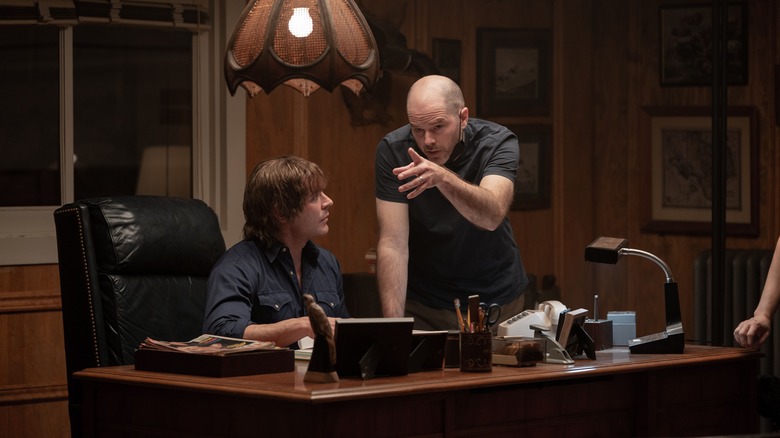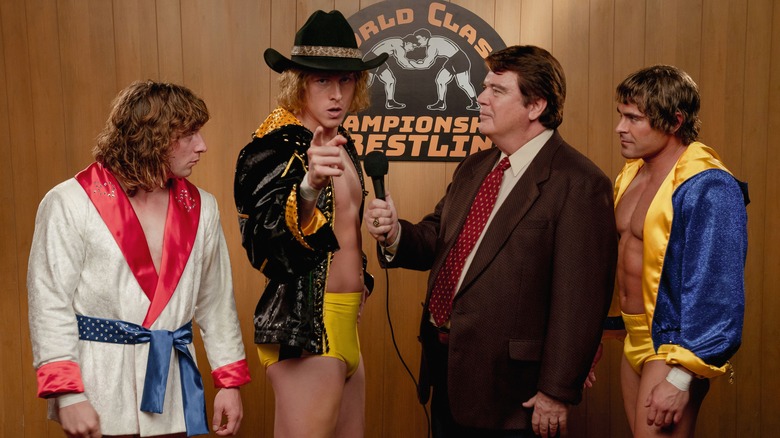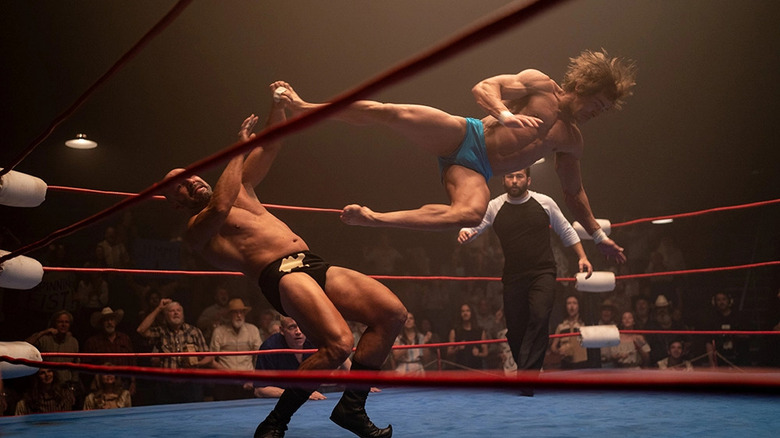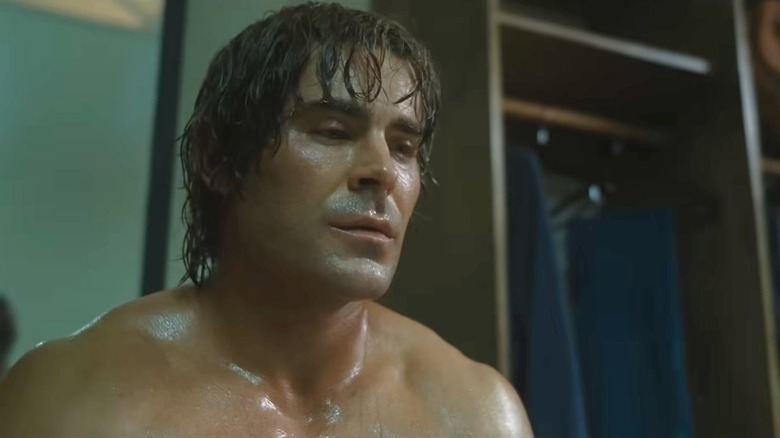The Iron Claw Director Sean Durkin On Wrestling Tragedies And Making Grown Men Cry [Exclusive Interview]
This post contains spoilers for "The Iron Claw."
Three things in life will consistently make me cry: Dogs being reunited with their owners after long periods of absence, when the Iron Giant says "Superman" at the end of "The Iron Giant," and professional wrestlers crying. Needless to say, "The Iron Claw" was guaranteed to obliterate me. Based on the tragic true story of the Von Erich wrestling dynasty, Sean Durkin's latest feature is not just a devastating folk tale of an American Shakespearean tragedy, but makes a case for becoming the best film ever made about the world of professional wrestling. As I wrote in my review of the film, "'The Iron Claw' is an emotionally eviscerating watch anchored by one of the best ensemble casts of the year."
A film like "The Iron Claw" cannot exist without the inherent passion of someone who has already bought into the magic of professional wrestling, which made Sean Durkin the perfect person to tell this story. Known for his cult-horror drama "Martha Marcy May Marlene" and the unsettling psychological family drama "The Nest," Durkin is also a dyed-in-the-wool wrestling fan, having grown up watching wrestling tapes of the territory era before the McMahon family takeover with WWF/WWE — namely, the Von Erich family and World Class Championship Wrestling out of the Dallas Sportatorium. I was privileged to speak with Durkin in honor of "The Iron Claw" finally hitting theaters across America, to figure out how he managed to capture the feel of watching live wrestling through a narrative lens, how to separate the legend of a man like Fritz Von Erich from the real person, and whether or not he feels guilty about making all of us cry on Christmas.
Note: This interview has been lightly edited for clarity and brevity.
Sean Durkin grew up watching the Von Erichs on VHS tapes
So I occupy a very fun intersection in that "Martha Marcy May Marlene" changed my life and also wrestling changed my life. So this is a wonderful conversation to be having.
I should be interviewing you! [laughs] I want to know more.
[laughs] You've spoken a lot about how you grew up watching old tapes of the Von Erichs, but what is it about them that you gravitated towards when there are countless wrestlers that you could have fixated on?
Just as a team — three such different individuals who just worked so well in the ring together — the family aspect, the fun they were having, they just felt so connected and there was so much love in the ring when they were together. Images like Kevin barefoot coming off the top rope, that just grabbed me. And the Sportatorium itself, the feel, it just looked different, it felt different. It just felt real in this way and I just wanted to be there. I wanted to experience it.
I like that you point out the realness of the Sportatorium because a lot of film depictions of wrestling has this "WWE gloss" to everything. But I watch "The Iron Claw" and I'm like, "That's wrassling." So what was your approach in how to capture that feeling?
Wrestling is at its best when it's storytelling. And so it's the same thing where it's just like, you're telling a story, it just happens to be wrestling. And some of the ways we've got into that was to wrestle full matches and to have the story play out in a full match. We trained the guys to be able to do that. And we had a live audience, so we just fully immersed in the matches and in the place. My production designer and I just worked rigorously on trying to recreate the Sportatorium the best we could with the space that we had and the details. I always want to feel it.
When I make a film, I always want to feel the place. And you can't really articulate to somebody how to do that. It's like an instinctual thing when we're making it. It's like, we're looking at the monitor, watching the footage being like, "Are we feeling it? Is the texture coming across?" And it's only something you see live and you make these little tweaks to make it happen. It's hard to put into words. It's just making sure it feels right.
It's palpable. My brain knew I was watching Zac Efron, but then he went off the top rope and kayfabe took over.
Thank you.
The trick to avoiding exploitation is to focus on the people
This is not an easy story to tell. And I feel like because of how many tragedies exist just in the history of wrestling, there's almost this inherent exploitative nature when people talk about wrestling tragedies. But this movie feels very respectful and honoring of this legacy. So approaching this material, how do you avoid those easy trappings?
Just trying to think about the people. Just always trying to think about the human side of it and always thinking about the human experience of those losses and just wanting to try and feel what it felt like for them. And you're never going to be able to do that fully because you can't tell a life fully in a movie. You can't tell a family life fully in a movie. But if you can create a piece of that emotion or just a piece of that experience or a moment from that experience that resonates. Again, it's just bringing it back to instinct and heart and just trying to give it that respect and give those feelings that respect and think about the character and just always thinking about the character's journey and how to do that in an honest way.
Speaking to that honesty, writing a character version of someone like Fritz Von Erich, I think, is incredibly difficult. Because to the wrestling world at large, he might as well be a supervillain. But to the people who knew him, and especially to Kevin, that's still his dad and that's still somebody that he has a great deal of love for. How do you even begin to approach writing him?
Yeah, I mean, I don't judge any of my characters no matter who they are or what they've done. So I have no judgment and I try to create a character that is full and nuanced. And the thing about Fritz that made it easy is that Fritz, as hard as he was, and as many bad decisions that he made — or we could judge them as being bad — I really believe he made decisions with love.
I think he loved his boys endlessly. So we're able to look at it now through our lens of now as being an overbearing patriarch. But then, he was coming from a place ... and if you think about where he came from and how violent that was, he's doing better than his father did and he is loving his boys and trying to prop them up and giving them what he believes to be the tools to survive in the world. Unfortunately, they were the opposite, because the world was changing and he wasn't seeing them in supporting their individualities. But yeah, I think he's coming from a place of love. So I tried to focus on that.
Sean Durkin wants you to cry on Christmas
I was very privileged to be able to see the premiere in Dallas and cry my face off, but now I gotta ask ... how do you feel knowing that you are about to be responsible for making thousands of people cry on Christmas?
I mean, that's what I hope for. [laughs] That's my dream. I hope the movie touches people and either helps express some pain that's tucked away that they're not expressing somewhere else or makes some men cry for the first time that maybe they've been trying not to cry. I think the more crying men, the better for our society.
Agreed.
Tears are good! We have a sign that hangs in our house that says, "You can cry here." And we try to live by that. So I think it's a good thing.
I cried a lot. I cry thinking about it. When you had Zac Efron deliver the, "Now I'm not a brother" line, which is an actual Kevin Von Erich quote, I sat there like ... "This mother effer, how dare he?" [laughs] So it's a good "how dare he." But also, how dare you?
You caught that! [laughs] Thank you. I really appreciate it.
"The Iron Claw" is now playing in theaters.



